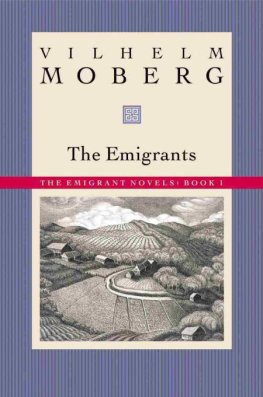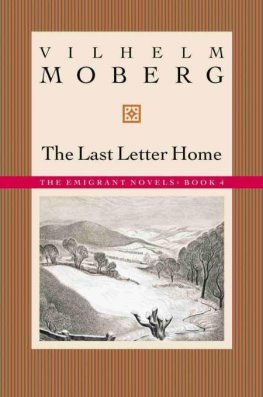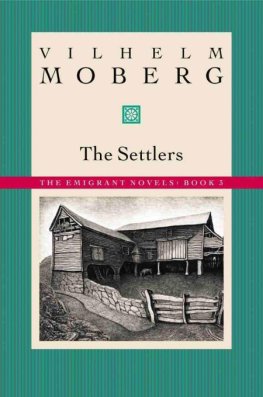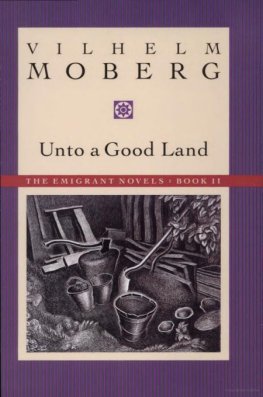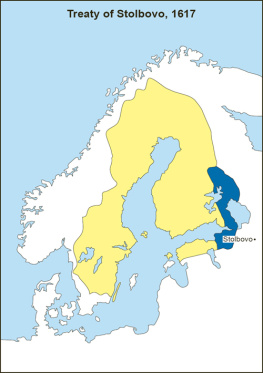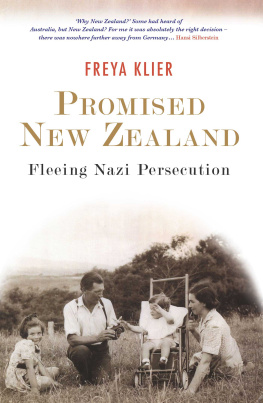Vilhelm Moberg - The Emigrants
Here you can read online Vilhelm Moberg - The Emigrants full text of the book (entire story) in english for free. Download pdf and epub, get meaning, cover and reviews about this ebook. year: 1995, publisher: Minnesota Historical Society Press, genre: Prose. Description of the work, (preface) as well as reviews are available. Best literature library LitArk.com created for fans of good reading and offers a wide selection of genres:
Romance novel
Science fiction
Adventure
Detective
Science
History
Home and family
Prose
Art
Politics
Computer
Non-fiction
Religion
Business
Children
Humor
Choose a favorite category and find really read worthwhile books. Enjoy immersion in the world of imagination, feel the emotions of the characters or learn something new for yourself, make an fascinating discovery.
- Book:The Emigrants
- Author:
- Publisher:Minnesota Historical Society Press
- Genre:
- Year:1995
- Rating:4 / 5
- Favourites:Add to favourites
- Your mark:
- 80
- 1
- 2
- 3
- 4
- 5
The Emigrants: summary, description and annotation
We offer to read an annotation, description, summary or preface (depends on what the author of the book "The Emigrants" wrote himself). If you haven't found the necessary information about the book — write in the comments, we will try to find it.
The Emigrants — read online for free the complete book (whole text) full work
Below is the text of the book, divided by pages. System saving the place of the last page read, allows you to conveniently read the book "The Emigrants" online for free, without having to search again every time where you left off. Put a bookmark, and you can go to the page where you finished reading at any time.
Font size:
Interval:
Bookmark:
Vilhelm Moberg
The Emigrants
To all my relatives in the United States,
and to the translator of this book,
Gustaf Lannestock from Sweden.
A note on the pronunciation of the Swedish names
is pronounced like the a in small (see Smland, literally Small Land)
is pronounced like the a in add
is pronounced like the ea in heard
j is pronounced like y
Introduction to the Emigrant Novels
Vilhelm Moberg: The Early Years
Hot-tempered, easily moved, and changeable was how the Swedish novelist Vilhelm Moberg once described himself.1 He might have added that in the first half of the twentieth century he was both the most widely admired and the most deeply distrusted of all Swedish authors. A man of humble origins but immense ambition and strong opinions, Moberg spent his entire literary life championing the rights of the common people. This tendency, combined with his volatile temperament, earned Moberg a deep, abiding respect from the general reading public while it created barriers for him among conservative critics, politicians, and religious leaders.
Mobergs biography has many elements of a rags-to-riches tale. He was born on August 28, 1898, in a small family cabin in southern Smland, historically one of the most impoverished areas of Sweden. The region had long been known as darkest Smland because of the peoples conservative Lutheranism and reluctance to accept other religious views. During Mobergs childhood years, only one railroad station existed in the vicinity of his family home, and the horse was still the most common mode of transportation. Clothes were made locally and often paid for by barter.
Mobergs father was a career soldier who farmed a small plot of forest land. His mother, who lived into her nineties, cared for the family. Although Moberg in his later nonfictional works remembered this rustic setting as the spot where I ran barefoot, his boyhood was one of hardship.2 He received just five years of formal schooling and was the only boy in his family who survived to adulthood. Even in his fifties, Moberg recalled the frustration of trying to satisfy his hunger for learning in an environment where the teaching was poor and books scarce.
In his teens and early twenties, Moberg worked as a manual laborer, chiefly among the lumberjacks and farm hands of Smland, and with great reluctance did his compulsory military service. His firsthand experiences from these years were later to serve as important motifs in his writings. Moberg left his parents home in 1916 to attend adult continuing education school (folkhgskola) in Grimslv. A nearly fatal bout of influenza brought his final attempt at formal schooling to an abrupt halt.
The enduring pattern of the aspiring writers life emerged in the decade of the 1920s. He worked as a journalist for small-town newspapers in southern Sweden, met his future wife, and got his start as a novelist. This period began what his biographer Magnus von Platen has called the gigantic day of work at the writing desk, which his life came to be.3 Moberg was nothing if not indefatigable. In addition to the daily routine of writing news stories, setting type, and selling advertising space, he wrote several novels before having one accepted for publication.4
His literary breakthrough came in 1927 with Raskens: en soldatfamiljs historia (Raskens: the story of a soldiers family). This novel, set in rural Smland, established Moberg as a writer for and of the common people and solidified his place among the ranks of the renowned Swedish working-class novelists (proletrfrfattare) of the 1920s and 1930s. These authors, including Jan Fridegrd, Ivar Lo-Johansson, and Moa Martinsson, were the first in Swedish literature to describe the lives of the lower classes from the perspective of men and women who themselves had grown up among the working poor. Mobergs depictions of the customs and way of life in Smland constituted his major contribution to this group of writers. The local realism in his early fiction was the foundation on which his popularity in Sweden was built. It was not until the publication of his four great novels about Swedish emigration to Minnesota that his fame spread to other countries in Europe and across the Atlantic.
In 1929 Moberg moved north to Stockholm with his wife and family. Despite his restless spirit, he kept a permanent residence near that city until his death on August 8, 1973.
Moberg and Emigration
Since his childhood, America had been an ever-present reality for Moberg. Historically, this is not surprising. Of the 1.2 million emigrants who left Sweden for America between 1845 and 1930, more than three hundred thousand came from Smland. Moberg recalled the impact the waves of emigration had on him. In his collection of autobiographical essays, Berttelser ur min levnad (Tales of my life), he wrote that his mother and father came from families so poor that all their brothers and sisters emigrated to the United States, leaving only his parents to perpetuate their respective family lines in Sweden.5 He claimed more relatives in America than in Sweden itself.
In his boyhood fancy, Moberg envisioned the word America as meaning mer-rika (more rich). The steady supply of America letters, the money orders in dollars, and the Swedish-American newspapers Moberg described as invading his boyhood home so sparked his imagination that at the age of eighteen he planned to emigrate himself, only to be stopped at the last moment, as he reported it, by his mothers and grandmothers laments that seeing a son off to America from the railway station was the same as attending the boys funeral.6
Perhaps as a substitute for his blighted hopes, Moberg dreamed as early as the 1920s of erecting a literary monument to those of his family members who settled in the New World. This dream was not to be realized until the late 1940s. During the 1930s Moberg, long a staunch supporter of socialist reforms, attacked the ruling Social Democratic party for its perpetuation of the bureaucracy and for its support of the Swedish State Church. Later, when World War II broke out, he criticized the government in Stockholm for its failure to take a firm stand against Nazism. His bestselling novel Rid i natt (Ride This Night), although set in the seventeenth century, was read by many as a comment on the tyranny of the Nazi era.
Mobergs outspoken tendencies concerning national issues produced a twofold personal effect. First, they guaranteed his disfavor among many influential public figures. Indeed Moberg remained embroiled in cultural debates on sensitive issues throughout the 1940s and early 1950s. He protested cases of blackmail and cover-ups in the Swedish police force and legal system and argued against the continued existence of the Swedish monarchy.
Second, his political involvement in combination with limitations on travel during World War II delayed until 1947 the time when he could begin writing on Swedish emigration. By then Moberg was almost fifty. He was celebrated in Sweden yet disillusioned with the countrys leadership. Seen through the lens of his personal dissatisfaction and from the perspective of a war-torn Europe, the United States appeared to Moberg in the late 1940s as the worlds last bastion of freedom and democracy. He seems to have felt a genuine desire to record the contribution made by Swedish emigrants to the country he thought was the worlds only remaining hope. Looking back on this time in 1968, Moberg wrote: I know that I have a genuine streak of stubbornness, a quality to be taken for better or worse. And I had made up my mind that I was going to cross the Atlantic Ocean in order to search out my unknown relations. For I could not get their destiny out of my mind. The older I became, the more it interested me.7
Font size:
Interval:
Bookmark:
Similar books «The Emigrants»
Look at similar books to The Emigrants. We have selected literature similar in name and meaning in the hope of providing readers with more options to find new, interesting, not yet read works.
Discussion, reviews of the book The Emigrants and just readers' own opinions. Leave your comments, write what you think about the work, its meaning or the main characters. Specify what exactly you liked and what you didn't like, and why you think so.

